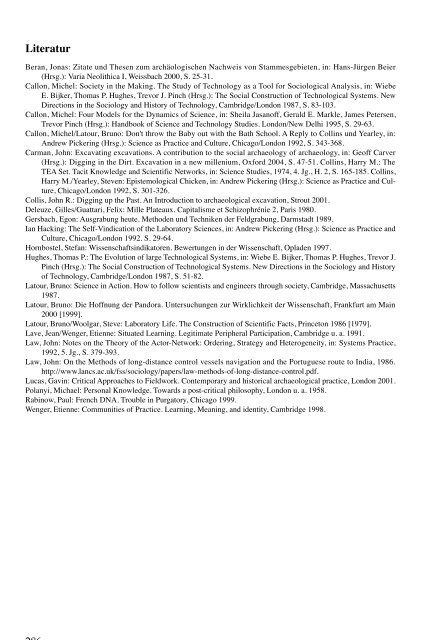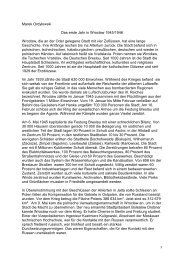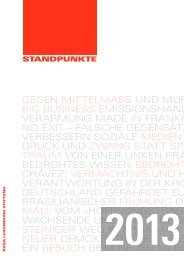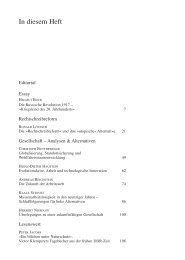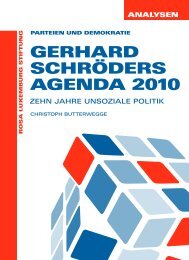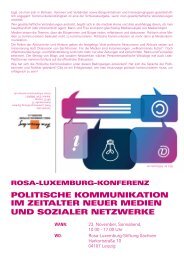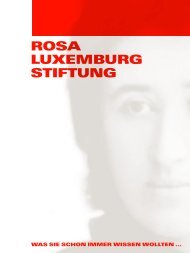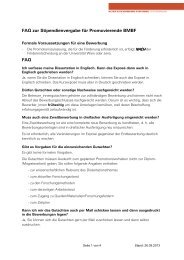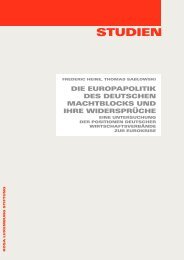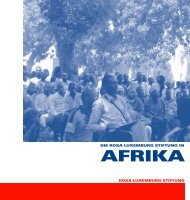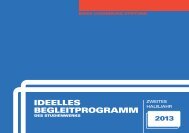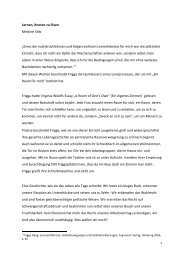Kritik mit Methode? - Rosa-Luxemburg-Stiftung
Kritik mit Methode? - Rosa-Luxemburg-Stiftung
Kritik mit Methode? - Rosa-Luxemburg-Stiftung
Erfolgreiche ePaper selbst erstellen
Machen Sie aus Ihren PDF Publikationen ein blätterbares Flipbook mit unserer einzigartigen Google optimierten e-Paper Software.
Literatur<br />
Beran, Jonas: Zitate und Thesen zum archäologischen Nachweis von Stammesgebieten, in: Hans-Jürgen Beier<br />
(Hrsg.): Varia Neolithica I, Weissbach 2000, S. 25-31.<br />
Callon, Michel: Society in the Making. The Study of Technology as a Tool for Sociological Analysis, in: Wiebe<br />
E. Bijker, Thomas P. Hughes, Trevor J. Pinch (Hrsg.): The Social Construction of Technological Systems. New<br />
Directions in the Sociology and History of Technology, Cambridge/London 1987, S. 83-103.<br />
Callon, Michel: Four Models for the Dynamics of Science, in: Sheila Jasanoff, Gerald E. Markle, James Petersen,<br />
Trevor Pinch (Hrsg.): Handbook of Science and Technology Studies. London/New Delhi 1995, S. 29-63.<br />
Callon, Michel/Latour, Bruno: Don't throw the Baby out with the Bath School. A Reply to Collins und Yearley, in:<br />
Andrew Pickering (Hrsg.): Science as Practice and Culture, Chicago/London 1992, S. 343-368.<br />
Carman, John: Excavating excavations. A contribution to the social archaeology of archaeology, in: Geoff Carver<br />
(Hrsg.): Digging in the Dirt. Excavation in a new millenium, Oxford 2004, S. 47-51. Collins, Harry M.: The<br />
TEA Set. Tacit Knowledge and Scientific Networks, in: Science Studies, 1974, 4. Jg., H. 2, S. 165-185. Collins,<br />
Harry M./Yearley, Steven: Epistemological Chicken, in: Andrew Pickering (Hrsg.): Science as Practice and Culture,<br />
Chicago/London 1992, S. 301-326.<br />
Collis, John R.: Digging up the Past. An Introduction to archaeological excavation, Strout 2001.<br />
Deleuze, Gilles/Guattari, Felix: Mille Plateaux. Capitalisme et Schizophrénie 2, Paris 1980.<br />
Gersbach, Egon: Ausgrabung heute. <strong>Methode</strong>n und Techniken der Feldgrabung, Darmstadt 1989.<br />
Ian Hacking: The Self-Vindication of the Laboratory Sciences, in: Andrew Pickering (Hrsg.): Science as Practice and<br />
Culture, Chicago/London 1992. S. 29-64.<br />
Hornbostel, Stefan: Wissenschaftsindikatoren. Bewertungen in der Wissenschaft, Opladen 1997.<br />
Hughes, Thomas P.: The Evolution of large Technological Systems, in: Wiebe E. Bijker, Thomas P. Hughes, Trevor J.<br />
Pinch (Hrsg.): The Social Construction of Technological Systems. New Directions in the Sociology and History<br />
of Technology, Cambridge/London 1987, S. 51-82.<br />
Latour, Bruno: Science in Action. How to follow scientists and engineers through society, Cambridge, Massachusetts<br />
1987.<br />
Latour, Bruno: Die Hoffnung der Pandora. Untersuchungen zur Wirklichkeit der Wissenschaft, Frankfurt am Main<br />
2000 [1999].<br />
Latour, Bruno/Woolgar, Steve: Laboratory Life. The Construction of Scientific Facts, Princeton 1986 [1979].<br />
Lave, Jean/Wenger, Etienne: Situated Learning. Legitimate Peripheral Participation, Cambridge u. a. 1991.<br />
Law, John: Notes on the Theory of the Actor-Network: Ordering, Strategy and Heterogeneity, in: Systems Practice,<br />
1992, 5. Jg., S. 379-393.<br />
Law, John: On the Methods of long-distance control vessels navigation and the Portuguese route to India, 1986.<br />
http://www.lancs.ac.uk/fss/sociology/papers/law-methods-of-long-distance-control.pdf.<br />
Lucas, Gavin: Critical Approaches to Fieldwork. Contemporary and historical archaeological practice, London 2001.<br />
Polanyi, Michael: Personal Knowledge. Towards a post-critical philosophy, London u. a. 1958.<br />
Rabinow, Paul: French DNA. Trouble in Purgatory, Chicago 1999.<br />
Wenger, Etienne: Communities of Practice. Learning, Meaning, and identity, Cambridge 1998.<br />
286


